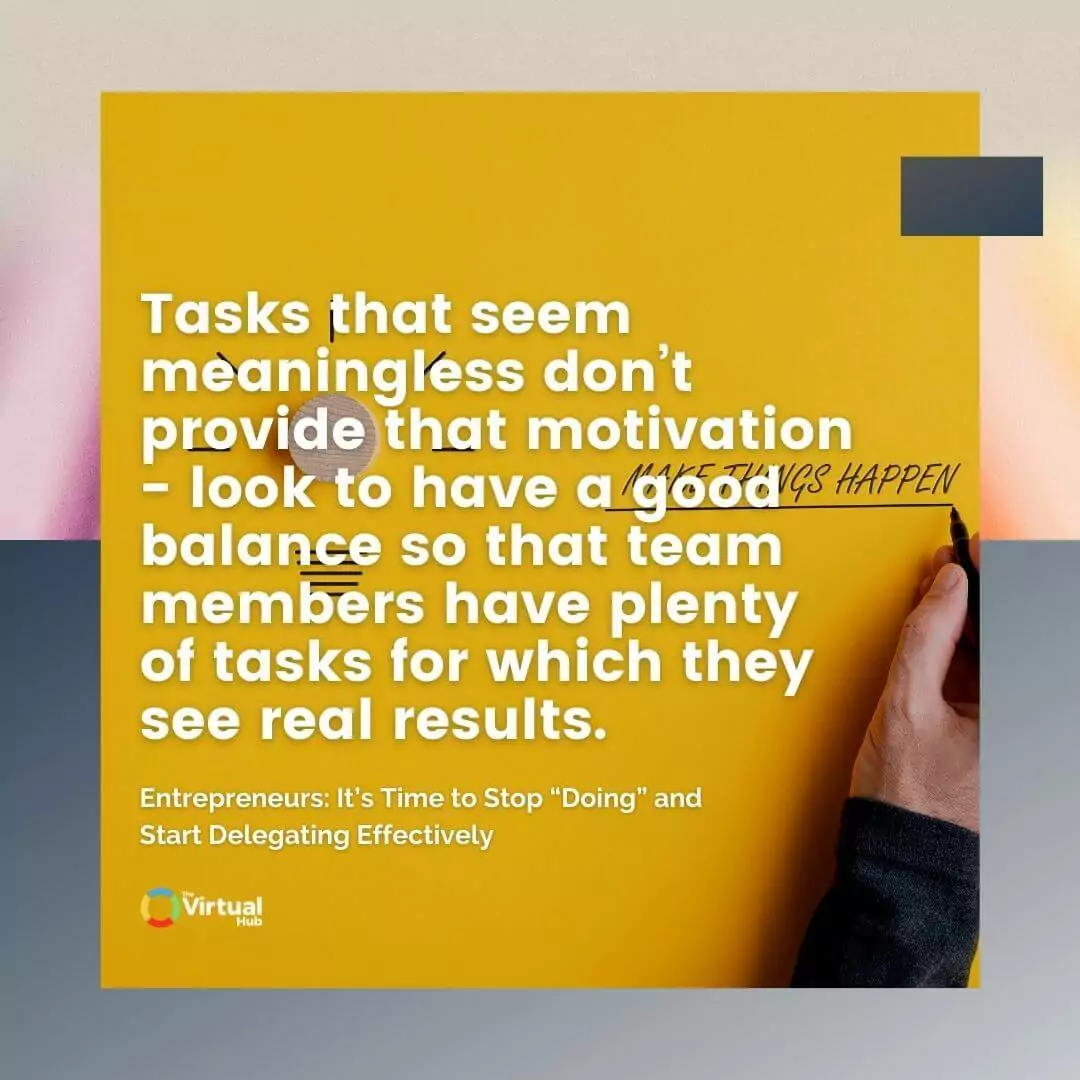Do you ever find yourself still caught up in too much “doing” despite delegating tasks to a virtual assistant or other team members?
From personal experience, entrepreneurs can be their own worst enemies with regard to struggling to let go of things. Perhaps they fall into the trap of thinking “no one can do this as well as I can,” or they’re caught up in feeling like they always have to be “on,” no matter what that might entail.
In any case, this can quickly add up to more overwhelm for the business owner, which is completely the opposite of what you’re hoping for when you hire a virtual assistant!

We’re here to say, drop that task right now, stop "doing," and consider the most valuable use of your time.
But, what does it take to get out of all of this “doing” and start delegating effectively instead? Let’s look at a few pointers.
RELATED: Best Tasks To Delegate To A Virtual Assistant From Expert Entrepreneurs
How to Delegate Tasks Effectively To A Virtual Assistant
You can click on these links below to jump on a specific section:
Shift Your Mindset
If you’re someone who struggles to let go of tasks, even though you have the resources to take advantage of delegation, rest assured you are not alone with this issue.
In fact, there have been a number of studies and reports outlining how people tend to struggle with letting go.
A Harvard Business Review report talks about how one of the most difficult transitions for leaders is to go from "doing" to "leading".
There is much admiration held for a “roll up your sleeves” attitude, but everyone reaches a point where this leads to overwhelm, or time not as effectively spent as it could be.
You could even look at it as adding more to your own plate, while denying employees an opportunity to grow within their roles.
For many people, getting to a point where they’re comfortable with task delegation means a mindset shift where they take a serious look at their own hold on work, and how letting that go might make them a better leader.
The Harvard report puts it well:

“While it may seem difficult, elevating your impact requires you to embrace an unavoidable leadership paradox: You need to be more essential and less involved. When you justify your hold on work, you’re confusing being involved with being essential. But the two are not the same — just as being busy and being productive are not necessarily equal.”
The first step to a mindset shift might involve getting out of a week-to-week or shorter-term mentality, and looking to the year ahead.
Yes, you might need to slow down your regular pace in order to devise effective systems and process for delegation, but doing so now will save you a huge amount of time in the long run.
One way of looking at it: it’s more important that your virtual assistants are operating effectively rather than trying to squeeze even more work out of yourself. This way, your business can be much more productive.
Another potential mindset shift is in how you view your employees. Do you see them as a cost, or do you see them as an investment in the success of your business?

Know What Type of Delegation You Would Like
One of the big “excuses” we hear for not delegating as much as possible goes something like: “Yep, tried that. I didn’t like the result.”
Have you considered that how you delegate can impact the results you get?
For example, if you were to say to someone “we need to organize a new webinar software provider,” they could easily take that to mean “go forth and procure some software.” That might be fine if you don’t really feel the need to approve of the software choice, but many people would absolutely hate this.
A Dropbox article describes the types of delegation as the following:
- “Do this exact thing”
- “Research and let me know”
- “Research and make a recommendation”
- “Research, take action, but keep me informed”
- “Just go for it…no need to check back in”

Establish what it is that you’re comfortable with for the particular tasks you need doing, and make sure you clearly communicate this with your virtual assistant.
Determine Which Tasks to Delegate
If you're like most small business owners, you probably wear a lot of hats. You're the CEO, the CFO, the head of HR, all rolled into one.
And while you might be good at all of those things, there are only so many hours in the day. There will come a point when you need to delegate some of the business activities. This is where virtual assistants can be a valuable asset.
But how do you know which tasks to delegate to a virtual assistant?
In general, virtual assistants can handle both personal and administrative work. However, every business is different, so it's important to take an inventory of your different tasks and decide which ones can be handled by someone else.
For example, if you find that you're spending several hours each day replying to customer emails, it might be time to pass off that responsibility to your virtual assistant.
You might also want to begin by categorizing your work into the following:
- Things that are important but not urgent
- Things that are urgent but not important
- Things that are both urgent and important
- Things that are neither urgent nor important
From here, you can start thinking about what tasks fall into each category, and whether or not they could be delegated.
For example, activities that are important but not urgent might include content research or social media outreach.
Tasks that are urgent but not important might include administrative work like setting up appointments or travel bookings.
Tasks that are both urgent and important might include customer support or sales calls.
And tasks that are neither urgent nor important might include things like checking the mailbox or tidying up the office.
Of course, not all activities will fit perfectly into one of these categories, but this can be a helpful way to start thinking about which tasks can be delegated.
When you’re first starting to delegate, it can be helpful to assign just a few tasks at first, so that you can get a feel for how it works and what your virtual assistant is capable of. You can always delegate more tasks as you get more comfortable with the process.
Some tasks that you might want to consider delegating to a virtual assistant include:
Personal Tasks
These are tasks that are specific to you and your life, such as managing your calendar or making a travel arrangement.
Administrative Tasks
Admin tasks are the behind-the-scenes tasks that keep your business running, such as bookkeeping or customer service. A virtual assistant can be a big help with these.
Creative Tasks
If you're not a creative person yourself, then it makes sense to delegate tasks like graphic design, editing videos, or email marketing to someone who is. That way, you can focus on the things that you're good at, and leave the creative job to someone who's better suited for it.
Email Management
If you find yourself spending hours every day sorting through and responding to emails, it may be time to hand this work off to a virtual assistant. They can manage your inbox, filter out spam, and even respond to routine inquiries.
Blog Post
If you maintain a blog for your business, writing posts can be time-consuming. A virtual assistant can help by researching blog topics, writing drafts, and even posting the finished product on your site.
Project Management
If you find yourself constantly scrambling to keep track of deadlines and meetings, then it might be time to delegate project management to a virtual assistant. They can take care of creating and updating timelines of projects, sending out reminders, and keeping everyone on track.
RELATED: 5 Ways Your VA Can Help You To Upscale Your Social Media Strategy
Calendar Management
A virtual assistant can also help with managing your calendar. They can handle setting up appointments with potential clients, booking travel, and sending reminders. This can be a huge time-saver, especially if you have a lot of meetings or travel frequently.
Online Research
Do you spend hours scouring the internet for information? A virtual assistant can do this research for you, freeing up your time to focus on other tasks.
Data Entry
Data entry is another task that often requires a lot of time and attention to detail. If you have data that needs to be entered into a spreadsheet or database, a virtual assistant can take care of this for you.
Social Media Management
If you’re active on social media, it can be time-consuming to keep up with all the posts and comments. A virtual assistant can help by scheduling posts, responding to comments, and even doing some of the research for you.
Really, the sky’s the limit when it comes to what you can delegate to a virtual assistant. If there’s anything that’s taking up your time and preventing you from working on tasks that are more important or that you enjoy more, then it’s a good candidate for delegation.
Provide Context
How many times have you been handed tasks where you really had no idea how to begin them? You flail around trying to get them going, but you have no idea whether you’re on the right track or not.
This is what can happen if you simply dump a list of tasks on a virtual assistant with no context behind them. It’s important to take the time to provide any essential background information, and ensure that they have what they need to get the tasks done according to what you are expecting.

Remember: no one is a mind reader!
As part of providing context, be clear about what things are a priority. It can help to establish a system where you categorize tasks by priority (such as a traffic light system), so that your virtual assistant knows exactly where to start.
Delegate Problems
David Bailey wrote a Medium post in which he describes his early forays into delegation of work. He describes his frustration when, after delegating a task to a team member, they did exactly as he asked but didn’t yield any results. He had the nagging feeling that there was something he could do better with how he delegated things.
That was when he got into a conversation with a mentor, who shared advice that set off a lightbulb moment:
“Delegate problems, not tasks.”
Why? Well, the member had done exactly what they were asked to do, but that didn’t solve the problem for the end-state that David desired.
Had he more specifically said; “I need interviews booked with potential candidates,” perhaps the person would have found a more successful way to get that done. Instead, they emailed recruiting agencies (which is what they were asked to do), and heard back from none of them.

As an extension of this, consider whether you would like to help develop virtual assistants by teaching new skills. It might take you some organizational time in the short-term, but can save you in the long-run when your upskilled members can take over key tasks.
Trust, But Verify
Task delegation tends to work out better if you demonstrate that you trust your virtual assistant to get the work done. No one enjoys having someone hanging over their shoulder, projecting the idea that perhaps they can’t be trusted.
Give people the space to get the project done however they see fit, but do check in from time to time to ensure that they are on-track for due dates, or to ensure that they know they can speak up if they need help.
Avoid Delegation Pitfalls
It’s worth checking in for a word on what effective delegation of tasks doesn’t look like.
One of the first things that comes to mind is the “seagull manager.” You know, the one who swoops by, gull-like, deposits a load of *%&^! on you in the form of “busy work”, then disappears again. This style of management is ineffective because it tends to demotivate employees.
While you might need some more tedious tasks taken care of (and it’s important that they’re not on your plate), it’s also vital to ensure that you’re giving work that motivates virtual assistants to do a good job. Tasks that seem meaningless don’t provide that motivation. Look to have a good balance so that members have plenty of tasks for which they see real results.
Plus, dumping a load of tasks and disappearing can leave members with the feeling that they’re not particularly valued. You’ll give the impression that you see them as “task robots” rather than integral members of a team. Consider the human side of the equation when you delegate, because people work well when they feel valued and recognized for their good work.

Final Thoughts
Delegating effectively might require a mindset shift. This is commonly a big challenge for leaders who have been used to “doing.” But learning to let go will make you more effective as a leader.
Learning to effectively delegate those tasks which you really don’t need to be doing helps you to make the space for activities which grow your business, rather than spending so much time on the hamster wheel.
Take steps to define how you will delegate and provide context to tasks, and consider how you might encourage the best work from the team member. Effective delegation means trusting team members to do the work, without being so hands-off that they’re left with the feeling of being on their own.
Set defined boundaries, and enjoy the benefits that delegating brings to your business!
Interested to learn more about all the kinds of tasks that you can delegate to a virtual assistant? Our Ultimate Guide to Virtual Assistants will teach you all you need to know from hiring a virtual to how you can manage one. Make sure to give it a read.
